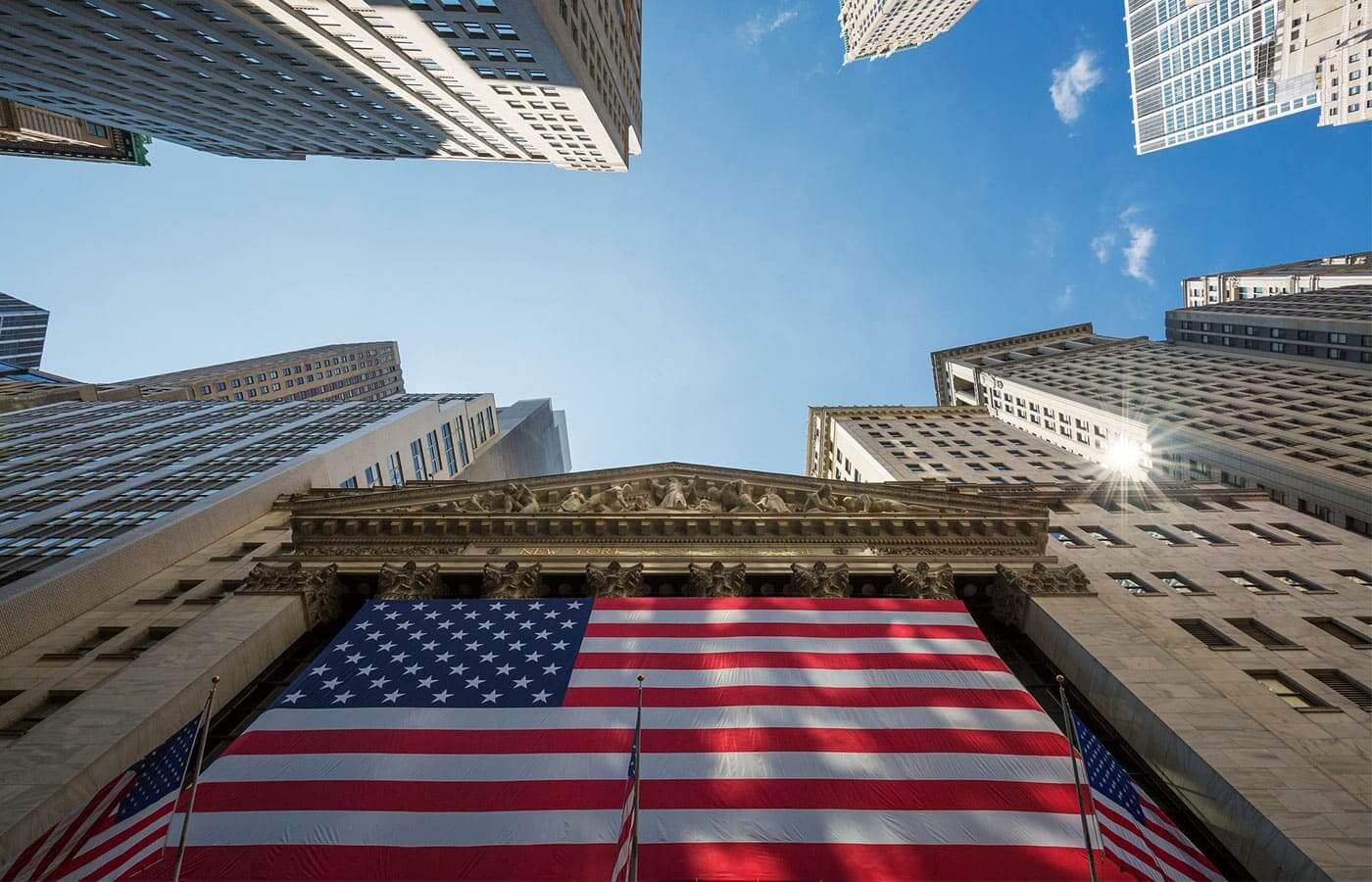The New York Stock Exchange (NYSE) is the largest equity-based exchange in the world on a total market capitalisation basis. This makes it the biggest marketplace for investors to buy and sell shares of publically traded companies.
Its history dates back to March 1817, when it was formally constituted. In the early days, brokers gathered twice a day on Wall Street in New York City to buy and sell a total of 30 listed stocks and bonds. As the United States developed as a country, more companies and government entities needed to raise money to fund the construction of projects like railroads, bridges, and canals. And by the end of the Civil War, the list of tradable securities increased to over 300.
As of September 2022, the New York Stock Exchange has 2,578 listed companies (1,980 domestic, 598 international). This is actually less than the 3,788 listed companies on the Nasdaq Exchange. Despite this, the total estimated market capitalisation of the NYSE stands at an estimated $22.7trn versus the Nasdaq’s $16.2trn.
How does the New York Stock Exchange work?
As with any other stock exchange, the NYSE is a middleman connecting buyers and sellers to facilitate stock trading. Just like the London Stock Exchange, it plays a vital role in helping businesses raise additional capital without having to rely solely on debt. This can be particularly advantageous when borrowing money is expensive due to high-interest rates.
Trading is executed through two distinct methods:
- Electronic Trading – NYSE-run computers receive, process, and execute trades in real-time. The machines attempt to match buyers and sellers based on the narrowest bid-ask spread. This innovative method of buying and selling shares was first introduced in 2005, resulting in more efficient market operations and lower trading costs for investors.
- Brokers – While less common today, brokers on the trading floor of the exchange still execute traders. These are typically for much larger orders from financial institutions or insurance companies requiring human negotiation and collaboration. In 2020, the NYSE temporarily relied on 100% electronic trading during the height of the pandemic. However, subsequent data analysis showed the markets operated at a higher quality. And in May 2020, traders steadily returned to the exchange trading floor.
What are the listing requirements for the NYSE?
Beyond having access to a large pool of investor capital, becoming listed on the New York Stock Exchange is a sign of prestige. This is why many international stocks prefer to become listed on the NYSE versus the Nasdaq Exchange despite the higher listing fees.
However, to become listed, companies must meet the minimum listing requirements.
A corporation must meet all of the following conditions:
- At least 1.1 million publicly held shares.
- At least 400 shareholders.
- An average monthly trading volume of 100,000 shares over the last six months.
- A market value of publically held shares of $100m, or $40m in the case of Initial Public Offerings (IPOs) and Spin-Offs
- A minimum share price of $4.
In addition, firms are required to meet at least one of the following financial standards:
- Earnings Test – The aggregate pre-tax income for the last three years must be equal to or greater than $10m. In the two most recent years, more than $2m must be generated yearly.
- Market Cap Test – The company must have a global market capitalisation of $200m for publically and privately held shares. For Business Development Companies, this threshold drops to just $75m.
- Equity Test – This applies to Real Estate Investment Trusts (REITs) only. To become listed on the New York Stock Exchange, REITs must have a stockholders’ equity of at least $60m.
What are the major indices listed on the exchange?
- NYSE Composite Index – Contains all common stocks listed on the New York Stock Exchange, including American depositary receipts, real estate investment trusts, tracking stocks, and foreign listings.
- Dow Jones Industrial Average – One of the oldest indices in the world, containing 30 prominent US blue-chip companies.
- S&P 500 – This stock market index tracks the performance of a total of 500 large companies listed on an American stock exchange.
- NYSE FANG – An equal-dollar weighted index that contains just 10 global stocks, including the widely popular FAANG companies (Meta, Amazon, Apple, Netflix, and Alphabet).
When is the New York Stock Exchange open?
The NYSE is open for trading between 9.30 am and 4.00 pm (Eastern Standard Time) Monday through Friday. When adjusting for time zones, the opening hours in the United Kingdom translate to 2.30 pm and 9.00 pm.
Additionally, there are several stock market holidays throughout the year when the New York Stock Exchange is closed or closes early.
| Holiday | Date | Status |
|---|---|---|
| New Year’s Day | Monday, 2 January 2023 | Closed |
| Martin Luther King Jr. Day | Monday, 16 January 2023 | Closed |
| Washington’s Birthday | Monday, 20 February 2023 | Closed |
| Good Friday | Friday, 7 April 2023 | Closed |
| Memorial Day | Monday, 29 May 2023 | Closed |
| Juneteenth National Independence Day | Monday, 19 June 2023 | Closed |
| Independence Day | Monday, 3 July 2023 Tuesday, 4 July 2023 | 9.00 am – 1.00 pm Closed |
| Labor Day | Monday, 4 September 2023 | Closed |
| Thanksgiving Day | Thursday, 23 November 2023 Friday, 24 November 2023 | Closed 9.00 am – 1.00 pm |
| Christmas | Monday, 25 December 2023 | Closed |
What are the top companies listed on the NYSE?
The top 10 businesses trading on the New York Stock Exchange in order of market capitalisation as of 23 February 2023:
| Rank | Company | Ticker | Market Cap |
|---|---|---|---|
| 1 | Berkshire Hathaway Inc. | BRK.B | $681.67bn |
| 2 | Visa Inc. | V | $490.10bn |
| 3 | Taiwan Semiconductor Manufacturing Company Limited | TSM | $483.85bn |
| 4 | Exxon Mobil Corporation | XOM | $476.12bn |
| 5 | UnitedHealth Group Incorporated | UNH | $454.14bn |
| 6 | Johnson & Johnson | JNJ | $439.83bn |
| 7 | JPMorgan Chase & Co. | JPM | $411.74bn |
| 8 | Walmart, Inc. | WMT | $386.45bn |
| 9 | Mastercard Incorporated | MA | $356.75bn |
| 10 | Chevron Corporation | CVX | $346.99bn |
The bottom line
The New York Stock Exchange is one of the largest exchanges around the globe. It houses major stock market indices and many of the top corporations worldwide. For many decades it has been the most popular exchange, which has been continuously serving short-term traders as well as long-term investors.
Discover market-beating stock ideas today. Join our Premium investing service to get instant access to analyst opinions, in-depth research, our Moonshot Opportunities, and more. Learn More
This article contains general educational information only. It does not take into account the personal financial situation of the reader. Tax treatment is dependent on individual circumstances that may change in the future, and this article does not constitute any form of tax advice. Before committing to any investment decision, an investor must consider their individual financial circumstances and reach out to an independent financial advisor if necessary.





